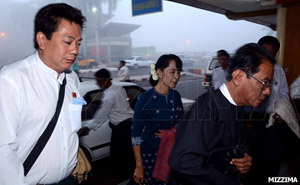Aung San Suu Kyi travels to Kachin State on Thursday to meet with members of the Kachin National Consultative Assembly (KNCA) and campaign in several cities.

The KNCA is made up of more than 50 members including the Kachin Independence Organization (KIO), businessmen and religious leaders. KNCA leaders are also trying to mediate the on-going peace talks between the Burmese government and KIO.
Suu Kyi has said that peace in ethnic regions is essential for Burma to advance economically and politically, and she has offered to mediate in the talks.
Suu Kyi will fly from Rangoon to Myitkyina to deliver a speech in a stadium in Namti village in Mogaung Township, where NLD members have built a special pavilion and will provide security, said Win Bo, a Namti Township NLD member.
On Friday, she will deliver a speech at Manau Stadium in Sitapu Quarter in Myitkyina. Suu Kyi will also speak in Bhamo, said campaign manager Nyan Win.
She will also meet with the abbot of the Wuntho Monastery in Myitkyina, according to sources close to the abbot.
Unlike other ethnic armed groups, the KIO said it would not agree on a cease-fire first, but would first discuss political issues. As a result, sporadic fighting still takes place, despite an order by the government to halt all offensives.
“A cease-fire is only the political consequences,” a KIO official told Mizzima. “We will focus on political talks which will be transparent, concrete and offer a clear path, and we will discuss how to resolve these political issues.”
The trip marks Suu Kyi’s third visit to Kachin State. She visited in 1989 and 2003. During her visit in 1989, she met with Duwa Zau Rip, who was involved in drafting the Panglong Agrement with General Aung San, Suu Kyi’s father.
In recent weeks, Suu Kyi has campaigned in Dawei (Tavoy), Pakokku, Pathein, Kawhmu, Helgu and Pyapon.
On Wednesday, seven members of the Mandalay Region NLD, including senior leader Win Mya Mya, traveled to Myitkyina via train carry clothes and 10 million kyat (about US$ 12,000) to donate to Kachin war refugees.


